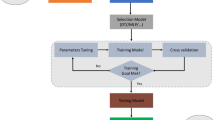Abstract
The harmless treatment of high-pollution geotechnical wastewater is of considerable importance to protect the surrounding ecological environment and expand the potential reuse utilization value of wastewater. Therefore, accurate prediction of wastewater treatment effect is an important guideline for precise control of wastewater treatment procedures. In this paper, a new prediction model, namely, LSALO-ANN, is proposed. The lightweight self-adaption ant lion optimizer (LSALO) was used to optimize the prediction model of artificial neural network (ANN). Taking the Dongqi tunnel supporting a ready-mixed concrete plant in Guangxi Province as a research case, food-grade sodium alginate is innovatively used to green treat this type of wastewater, and the turbidity removal rate of this kind of geotechnical wastewater can reach 98.77% under optimal conditions. Relevant experimental data is used as the data set to realize the establishment and validation of the prediction model. In addition, the LSALO algorithm is compared with particle swarm optimization (PSO) and genetic algorithm (GA). Prediction model test results show that the LSALO-ANN prediction model has a mean relative error (MRE) of 8.37% and goodness of fit (R2) of 0.9786 for the test set data, which is superior to 11.91% and 0.9625 of PSO-ANN and 12.41% and 0.9596 of GA-ANN considering prediction accuracy and generalization capability, respectively. The results prove that the LSALO algorithm effectively improved the reliability of prediction data output by ANN and further provide an effective method for real-time adjustment of wastewater treatment process parameters.













Similar content being viewed by others
References
Abujazar MSS, Karaağaç SU, Abu Amr SS, et al (2022) Recent advancement in the application of hybrid coagulants in coagulation-flocculation of wastewater: A review. J Clean Prod 345
Aruntaş HY, Nallı E, Kaplan G (2022) Usage of ready-mixed concrete plant wastewater in concrete with superplasticizer: Effect on physico-mechanical properties. Constr Build Mater 348:128641. https://doi.org/10.1016/j.conbuildmat.2022.128641
Bakr AR, Fu GY, Hedeen D (2020) Water quality impacts of bridge stormwater runoff from scupper drains on receiving waters: A review. Sci Total Environ 726
Bardhan A, Biswas R, Kardani N, et al (2022) A novel integrated approach of augmented grey wolf optimizer and ANN for estimating axial load carrying-capacity of concrete-filled steel tube columns. Constr Build Mater 337:127454. https://doi.org/10.1016/j.conbuildmat.2022.127454
Baykus N, Karpuzcu M, Yurtsever A (2022) An investigation into the role of treatment performance and soil characteristics of soil-based wastewater treatment systems. Water Sci Technol 85:. https://doi.org/10.2166/wst.2021.512
Chang I, Lee M, Cho GC (2019) Global CO2 emission-related geotechnical engineering hazards and the mission for sustainable geotechnical engineering. Energies (Basel) 12
Cong Q, Yu W (2018) Integrated soft sensor with wavelet neural network and adaptive weighted fusion for water quality estimation in wastewater treatment process. Measurement (Lond) 124:. https://doi.org/10.1016/j.measurement.2018.01.001
Dejong JT, Soga K, Kavazanjian E, et al (2013) Biogeochemical processes and geotechnical applications: progress, opportunities and challenges. Geotechnique 63:. https://doi.org/10.1680/geot.SIP13.P.017
Griffin EP, Kurup PU (2017) Prediction of OCR and su from PCPT Data Using Tree-Based Data Fusion Techniques. J Geotech Geoenviron Eng 143:. https://doi.org/10.1061/(asce)gt.1943-5606.0001726
Han SC, Kim KD, Kanok-Nukulchai W (2004) An element-based 9-node resultant shell element for large deformation analysis of laminated composite plates and shells. Struct Eng Mech 18:807–829. https://doi.org/10.12989/sem.2004.18.6.807
Koopialipoor M, Jahed Armaghani D, Haghighi M, Ghaleini EN (2019) A neuro-genetic predictive model to approximate overbreak induced by drilling and blasting operation in tunnels. Bull Eng Geol Env 78:981–990. https://doi.org/10.1007/s10064-017-1116-2
Li B, Fu Y, Hong Y, Cao Z (2021) Deterministic and probabilistic analysis of tunnel face stability using support vector machine. Geomech Eng 25:. https://doi.org/10.12989/gae.2021.25.1.017
Li Q, Qian R, Gao J, Huang J (2022) Environmental impacts and risks of bridges and tunnels across lakes: an overview. J Environ Manage 319:115684. https://doi.org/10.1016/j.jenvman.2022.115684
Li W, Yi Y, Puppala AJ (2020) Suppressing ettringite-induced swelling of gypseous soil by using magnesia-activated ground granulated blast-furnace slag. J Geotech Geoenviron Eng 146:. https://doi.org/10.1061/(asce)gt.1943-5606.0002292
Lin P, Xiong Y, Xu Z et al (2022) Risk assessment of TBM jamming based on Bayesian networks. Bull Eng Geol Env 81:47. https://doi.org/10.1007/s10064-021-02511-z
Liu J, Jiang Y, Han W, Sakaguchi O (2021) Optimized ANN model for predicting rock mass quality ahead of tunnel face using measure-while-drilling data. Bull Eng Geol Env 80:2283–2305. https://doi.org/10.1007/s10064-020-02057-6
McCulloch WS, Pitts W (1943) A logical calculus of the ideas immanent in nervous activity. Bull Math Biophys 5:115–133. https://doi.org/10.1007/BF02478259
Mirjalili S (2015) The Ant Lion Optimizer. Adv Eng Softw 83:80–98. https://doi.org/10.1016/j.advengsoft.2015.01.010
Mirjalili S, Mirjalili SM, Hatamlou A (2016) Multi-Verse Optimizer: a nature-inspired algorithm for global optimization. Neural Comput Appl 27:495–513. https://doi.org/10.1007/s00521-015-1870-7
Mohamad ET, Jahed Armaghani D, Momeni E, Abad ANK, SV, (2015) Prediction of the unconfined compressive strength of soft rocks: a PSO-based ANN approach. Bull Eng Geol Env 74:745–757. https://doi.org/10.1007/s10064-014-0638-0
Nguyen-Thanh N, Rabczuk T, Nguyen-Xuan H, Bordas SPA (2008) A smoothed finite element method for shell analysis. Comput Methods Appl Mech Eng 198:165–177. https://doi.org/10.1016/j.cma.2008.05.029
Ossai IC, Ahmed A, Hassan A, Hamid FS (2020) Remediation of soil and water contaminated with petroleum hydrocarbon: A review. Environ Technol Innov 17
Park KC, Stanley GM (1986) A Curved C0 Shell Element Based on Assumed Natural-Coordinate Strains. J Appl Mech 53:278–290. https://doi.org/10.1115/1.3171752
Rumelhart DE, Hinton GE, Williams RJ (1986) Learning representations by back-propagating errors. Nature 323:. https://doi.org/10.1038/323533a0
Sangtarash H, Arab HG, Sohrabi MR, Ghasemi MR (2021) A high-performance four-node flat shell element with drilling degrees of freedom. Eng Comput 37:2837–2852. https://doi.org/10.1007/s00366-020-00974-4
Shirani Faradonbeh R, Taheri A (2019) Long-term prediction of rockburst hazard in deep underground openings using three robust data mining techniques. Eng Comput 35:. https://doi.org/10.1007/s00366-018-0624-4
Singh PK, Deshbhratar PB, Ramteke DS (2012) Effects of sewage wastewater irrigation on soil properties, crop yield and environment. Agric Water Manag 103:. https://doi.org/10.1016/j.agwat.2011.10.022
Subhashini KR, Satapathy JK (2017) Development of an enhanced ant lion optimization algorithm and its application in antenna array synthesis. Appl Soft Comput 59:153–173. https://doi.org/10.1016/j.asoc.2017.05.007
Sze KY (1994) An explicit hybrid-stabilized 9-node Lagrangian shell element. Comput Methods Appl Mech Eng 117:361–379. https://doi.org/10.1016/0045-7825(94)90123-6
Tang R-X, Kulatilake PHSW, Yan E-C, Cai J-S (2020) Evaluating landslide susceptibility based on cluster analysis, probabilistic methods, and artificial neural networks. Bull Eng Geol Env 79:2235–2254. https://doi.org/10.1007/s10064-019-01684-y
Wang J, Wen Y, Ye Z, et al (2017) Convergence analysis of BP neural networks via sparse response regularization. Appl Soft Comput J 61:. https://doi.org/10.1016/j.asoc.2017.07.059
Wang Q, Yang Z (2016) Industrial water pollution, water environment treatment, and health risks in China. Environ Pollut 218:. https://doi.org/10.1016/j.envpol.2016.07.011
Wang ZZ (2022) Deep learning for geotechnical reliability analysis with multiple uncertainties. J Geotech Geoenviron Eng 148. https://doi.org/10.1061/(asce)gt.1943-5606.0002771
Xu L, Yan D, Zhao T (2021) Probabilistic evaluation of loess landslide impact using multivariate model. Landslides 18:1011–1023. https://doi.org/10.1007/s10346-020-01521-4
Zhang C, Wang H, Yang X, You Z (2018) A combinational prediction model for transverse crack of asphalt pavement. KSCE J Civ Eng 22:. https://doi.org/10.1007/s12205-018-1867-8
Zhang D, Liu M, Wang X, Zhao W (2021) Research on the water environment pollution source investigation and control technology during the highway construction period of Qiandao Lake District. In: E3S Web of Conferences
Zhang J, Gu F, Zhang Y (2019a) Use of building-related construction and demolition wastes in highway embankment: Laboratory and field evaluations. J Clean Prod 230:. https://doi.org/10.1016/j.jclepro.2019.05.182
Zhang N, Duan H, Sun P, et al (2020) Characterizing the generation and environmental impacts of subway-related excavated soil and rock in China. J Clean Prod 248:. https://doi.org/10.1016/j.jclepro.2019.119242
Zhang Y, Gao X, Smith K, et al (2019b) Integrating water quality and operation into prediction of water production in drinking water treatment plants by genetic algorithm enhanced artificial neural network. Water Res 164:. https://doi.org/10.1016/j.watres.2019.114888
Zhao BD, Zhang LL, Jeng DS, et al (2015) Inverse analysis of deep excavation using differential evolution algorithm. Int J Numer Anal Methods Geomech 39:. https://doi.org/10.1002/nag.2287
Zhou J, Koopialipoor M, Li E, Armaghani DJ (2020) Prediction of rockburst risk in underground projects developing a neuro-bee intelligent system. Bull Eng Geol Environ 79:. https://doi.org/10.1007/s10064-020-01788-w
Zhou Z, Zhang J, Gong C (2022) Automatic detection method of tunnel lining multi-defects via an enhanced You Only Look Once network. Comput-Aided Civil Infrastruct Eng 37:. https://doi.org/10.1111/mice.12836
Funding
This research work was financially supported by the National Natural Science Foundation of China (Grant No. 50908234) and the Natural Science Foundation of Hunan Province, China (Grant No. 2020JJ4743).
Author information
Authors and Affiliations
Ethics declarations
Competing interests
The authors declare no competing interests.
Appendix
Appendix
Rights and permissions
Springer Nature or its licensor (e.g. a society or other partner) holds exclusive rights to this article under a publishing agreement with the author(s) or other rightsholder(s); author self-archiving of the accepted manuscript version of this article is solely governed by the terms of such publishing agreement and applicable law.
About this article
Cite this article
Zhou, Z., Ding, H., Zhang, J. et al. Using an enhanced ant lion optimizer to improve artificial neural networks for the prediction of food-grade sodium alginate treatment effects for ready-mixed concrete plant wastewater. Bull Eng Geol Environ 82, 287 (2023). https://doi.org/10.1007/s10064-023-03286-1
Received:
Accepted:
Published:
DOI: https://doi.org/10.1007/s10064-023-03286-1




